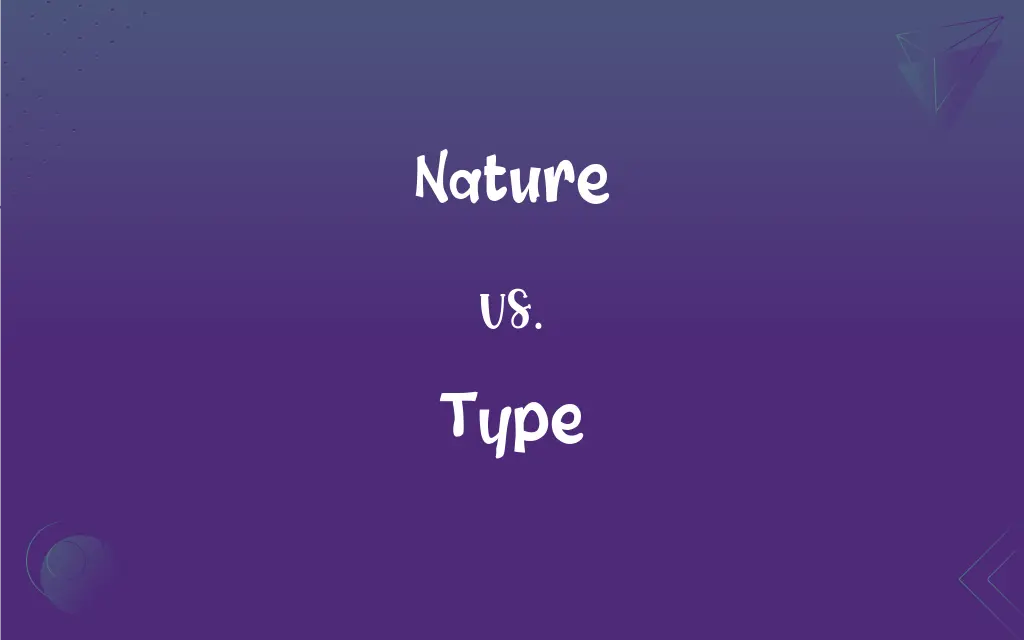Nature vs. Type: What's the Difference?
Edited by Harlon Moss || By Janet White || Updated on October 3, 2023
Nature refers to inherent or essential qualities of something, whereas Type classifies or categorizes items based on shared characteristics. Nature is more about what something "is," while Type is more about what category something "belongs to."

Key Differences
Nature is a word often used to describe the inherent or essential qualities of something. It speaks to the very essence of a thing—its character, disposition, or fundamental traits. Type, on the other hand, is used to categorize or classify things based on common attributes or characteristics. While Nature digs into the core qualities, Type places things in a broader category.
When discussing the Nature of a person, you may delve into their temperament, natural instincts, or basic disposition. For example, if someone is kind-hearted by nature, that’s speaking to their inherent traits. In contrast, when describing the Type of person, you might say they are an extrovert, which is a category of social behavior, not necessarily an innate characteristic.
The word Nature is also versatile, as it can apply to phenomena, events, and the universe at large ("Mother Nature"). However, Type is generally not applied in such a broad manner. For example, you wouldn't generally discuss the "type of weather"; instead, you'd discuss its nature—is it humid, dry, etc.
Both words, Nature and Type, can be used in a variety of contexts, but they are not interchangeable. Nature tends to be more philosophical and intrinsic, focusing on the underlying reality of things. Type is generally more pragmatic, aiming to classify or categorize items based on observable traits or standards.
Comparison Chart
Context of Use
Philosophical, Intrinsic
Pragmatic, Classifying
ADVERTISEMENT
Focus
What something "is"
What category it belongs to
Scope
Broad
Narrower
Common Usages
Individuals, phenomena, universe
Objects, people, systems
Application
Inherent qualities
Shared characteristics
Nature and Type Definitions
Nature
Inherent or essential qualities
The nature of water is to flow.
ADVERTISEMENT
Type
A representation of something
He's a type of the modern entrepreneur.
Nature
The physical world collectively
The beauty of nature is awe-inspiring.
Type
A set standard or example
She is the type to always help others.
Nature
An individual's temperament
His nature is calm and thoughtful.
Type
A printed or written character
The document was set in bold type.
Nature
The fundamental properties of something
The nature of the business is high-risk.
Type
A number of people or things having in common traits or characteristics that distinguish them as a group or class:That type of car was popular in the 1970s. See Synonyms at kind.
Nature
The universe and its laws
The laws of nature are constant.
Type
A person or thing having the features of a group or class:He is the type of person that is bound to get into trouble.
Nature
The material world and its phenomena
Scientists analyzing nature.
Type
An example or a model having the ideal features of a group or class; an embodiment:"He was the perfect type of a military dandy"(Joyce Cary).
Nature
The forces and processes that produce and control these phenomena
The balance of nature.
Type
A person regarded as exemplifying a particular profession, rank, or social group:a group of executive types; a restaurant frequented by tourist types.
Nature
The world of living things and the outdoors
Spent the day enjoying nature.
Type
A figure, representation, or symbol of something to come, such as an event in the Old Testament that is believed to foreshadow another in the New Testament.
Nature
A primitive state of existence, untouched and uninfluenced by civilization or social constraints
When people lived in a state of nature.
Type
(Biology)The type specimen, type species, or type genus, which serves as the basis for the name of a species, genus, or family.
Nature
The basic character or qualities of humanity
It is only human nature to worry about the future.
Type
A small block of metal or wood bearing a raised letter or character on the upper end that leaves a printed impression when inked and pressed on paper.
Nature
The fundamental character or disposition of a person; temperament
A man of an irascible nature.
Type
Such pieces considered as a group.
Nature
The set of inherent characteristics or properties that distinguish something
Trying to determine the nature of a newly discovered phenomenon.
Type
Printed or typewritten characters; print:Let's see how your letter looks in type.
Nature
A kind or sort
Confidences of a personal nature.
Type
A size or style of printed or typewritten characters; a typeface:a sans-serif type.
Nature
The processes and functions of the body, as in healing
The doctor decided not to do anything and let nature take its course.
Type
A pattern, a design, or an image impressed or stamped onto the face of a coin.
Nature
Heredity
Behavior more influenced by nature than nurture.
Type
To write (something) using a typewriter.
Nature
The way things are, the totality of all things in the physical universe and their order, especially the physical world in contrast to spiritual realms and flora and fauna as distinct from human conventions, art, and technology.
Nature doesn't lie.
The laws of nature are written in the language of mathematics.
Tectonic activity is part of nature, so there's no way to stop earthquakes.
Type
To input (something) manually on an electronic device, especially by using a keyboard.
Nature
The particular way someone or something is, especially
Type
To assign to a category; classify or characterize:a political candidate who was typed as indecisive.
Nature
The essential or innate characteristics of a person or thing which will always tend to manifest, especially in contrast to specific contexts, reason, religious duty, upbringing, and personal pretense or effort.
It's not in my nature to steal.
You can't help feeling that way. It's human nature.
Power corrupts. That's just the nature of the beast.
Type
To determine the antigenic characteristics of (a blood or tissue sample).
Nature
The distinguishing characteristic of a person or thing, understood as its general class, sort, type, etc.
What was the nature of your relationship with the deceased?
The best medium might be petroleum, liquified gas, or something of that nature.
Type
To typecast:an actor afraid of being typed as a gangster.
Nature
Synonym of caliber: the class of a gun.
Type
To write with a typewriter or computer keyboard.
Nature
The vital functions or strength of someone or something, especially as requiring nourishment or careful maintenance or (medicine) as a force of regeneration without special treatment.
Type
A grouping based on shared characteristics; a class.
This type of plane can handle rough weather more easily than that type of plane.
Nature
A requirement or powerful impulse of the body's physical form, especially
Type
An individual considered typical of its class, one regarded as typifying a certain profession, environment, etc.
Nature
The need to urinate and defecate.
I hear the call of nature.
Type
An individual that represents the ideal for its class; an embodiment.
Nature
Sexual desire.
Type
A letter or character used for printing, historically a cast or engraved block.
Nature
Spontaneous love, affection, or reverence, especially between parent and child.
Type
(uncountable) Such types collectively, or a set of type of one font or size.
Nature
A product of the body's physical form, especially semen and vaginal fluids, menstrual fluid, and (obsolete) feces.
Type
Text printed with such type, or imitating its characteristics.
The headline was set in bold type.
Nature
A part of the body's physical form, especially (obsolete) the female genitalia.
Type
(taxonomy) Something, often a specimen, selected as an objective anchor to connect a scientific name to a taxon; this need not be representative or typical.
Nature
(obsolete) To endow with natural qualities.
Type
Preferred sort of person; sort of person that one is attracted to.
We can't get along: he's just not my type.
He was exactly her type.
Nature
The existing system of things; the universe of matter, energy, time and space; the physical world; all of creation. Contrasted with the world of mankind, with its mental and social phenomena.
But looks through nature up to nature's God.
When, in the course of human Events, it becomes necessary for one People to dissolve the Political Bonds which have connected them with another, ans to assume among the powers of the earth the separate and equal Station which the Laws of Nature and of Nature's God entitle them, a decent Respect to the Opinions of Mankind requires that they should declare the causes that impel them to the Separation.
Nature has caprices which art can not imitate.
Type
(medicine) A blood group.
Nature
The personified sum and order of causes and effects; the powers which produce existing phenomena, whether in the total or in detail; the agencies which carry on the processes of creation or of being; - often conceived of as a single and separate entity, embodying the total of all finite agencies and forces as disconnected from a creating or ordering intelligence; as, produced by nature; the forces of nature.
I oft admireHow Nature, wise and frugal, could commitSuch disproportions.
Type
(corpus linguistics) A word that occurs in a text or corpus irrespective of how many times it occurs, as opposed to a token.
Nature
The established or regular course of things; usual order of events; connection of cause and effect.
Type
(theology) An event or person that prefigures or foreshadows a later event - commonly an Old Testament event linked to Christian times.
Nature
Conformity to that which is natural, as distinguished from that which is artificial, or forced, or remote from actual experience.
One touch of nature makes the whole world kin.
Type
(computing theory) A tag attached to variables and values used in determining which kinds of value can be used in which situations; a data type.
Nature
The sum of qualities and attributes which make a person or thing what it is, as distinct from others; native character; inherent or essential qualities or attributes; peculiar constitution or quality of being.
Thou, therefore, whom thou only canst redeem,Their nature also to thy nature join,And be thyself man among men on earth.
Type
(fine arts) The original object, or class of objects, scene, face, or conception, which becomes the subject of a copy; especially, the design on the face of a medal or a coin.
Nature
Kind, sort; character; quality.
A dispute of this nature caused mischief.
Type
(chemistry) A simple compound, used as a mode or pattern to which other compounds are conveniently regarded as being related, and from which they may be actually or theoretically derived.
The fundamental types used to express the simplest and most essential chemical relations are hydrochloric acid, water, ammonia, and methane.
Nature
Physical constitution or existence; the vital powers; the natural life.
Oppressed nature sleeps.
Type
(mathematics) A part of the partition of the object domain of a logical theory (which due to the existence of such partition, would be called a typed theory). (Note: this corresponds to the notion of "data type" in computing theory.)
Categorial grammar is like a combination of context-free grammar and types.
Nature
Natural affection or reverence.
Have we not seenThe murdering son ascend his parent's bed,Through violated nature force his way?
Type
A symbol, emblem, or example of something.
Nature
Constitution or quality of mind or character.
A born devil, on whose natureNurture can never stick.
That reverence which is due to a superior nature.
Type
To put text on paper using a typewriter.
Nature
To endow with natural qualities.
He [God] which natureth every kind.
Type
To enter text or commands into a computer using a keyboard.
Nature
The essential qualities or characteristics by which something is recognized;
It is the nature of fire to burn
The true nature of jealousy
Type
To determine the blood type of.
The doctor ordered the lab to type the patient for a blood transfusion.
Nature
A causal agent creating and controlling things in the universe;
The laws of nature
Nature has seen to it that men are stronger than women
Type
To represent by a type, model, or symbol beforehand; to prefigure.
Nature
The natural physical world including plants and animals and landscapes etc.;
They tried to preserve nature as they found it
Type
To furnish an expression or copy of; to represent; to typify.
Nature
The complex of emotional and intellectual attributes that determine a person's characteristic actions and reactions;
It is his nature to help others
Type
To categorize into types.
Nature
A particular type of thing;
Problems of this type are very difficult to solve
He's interested in trains and things of that nature
Matters of a personal nature
Type
The mark or impression of something; stamp; impressed sign; emblem.
The faith they have in tennis, and tall stockings,Short blistered breeches, and those types of travel.
Type
Form or character impressed; style; semblance.
Thy father bears the type of king of Naples.
Type
A figure or representation of something to come; a token; a sign; a symbol; - correlative to antitype.
A type is no longer a type when the thing typified comes to be actually exhibited.
Type
That which possesses or exemplifies characteristic qualities; the representative.
Since the time of Cuvier and Baer . . . the whole animal kingdom has been universally held to be divisible into a small number of main divisions or types.
Type
The original object, or class of objects, scene, face, or conception, which becomes the subject of a copy; esp., the design on the face of a medal or a coin.
Type
A raised letter, figure, accent, or other character, cast in metal or cut in wood, used in printing.
Type
A simple compound, used as a model or pattern to which other compounds are conveniently regarded as being related, and from which they may be actually or theoretically derived.
Type
To represent by a type, model, or symbol beforehand; to prefigure.
Type
To furnish an expression or copy of; to represent; to typify.
Let us type them now in our own lives.
Type
A subdivision of a particular kind of thing;
What type of sculpture do you prefer?
Type
A person of a specified kind (usually with many eccentricities);
A real character
A strange character
A friendly eccentric
The capable type
A mental case
Type
(biology) the taxonomic group whose characteristics are used to define the next higher taxon
Type
Printed characters;
Small type is hard to read
Type
A small metal block bearing a raised character on one end; produces a printed character when inked and pressed on paper;
He dropped a case of type, so they made him pick them up
Type
All of the tokens of the same symbol;
The word `element' contains five different types of character
Type
Write by means of a keyboard with types;
Type the acceptance letter, please
Type
Identify as belonging to a certain type;
Such people can practically be typed
Type
A category based on shared characteristics
This type of tree sheds its leaves.
Type
A model or design
What type of phone do you have?
FAQs
Is Type used for categorizing objects?
Yes, Type is often used to categorize objects based on shared traits.
Can Nature refer to the physical world?
Yes, Nature can refer to the physical world, as in "Mother Nature."
Is Nature about essence or category?
Nature is about the essence or inherent qualities of something.
Does Type classify or describe inherent qualities?
Type classifies or categorizes based on shared characteristics.
Can Type be used to describe systems?
Yes, Type can be used to categorize systems based on their functions or characteristics.
Can Type describe individuals?
Yes, but usually by placing them in broader categories, such as "type of learner."
Can Nature describe human characteristics?
Yes, Nature can describe inherent human traits, such as temperament.
Is Nature a broader term than Type?
Generally, Nature has a broader scope than Type.
Can Type refer to a model or design?
Yes, Type can refer to a model or design, as in "What type of car do you drive?"
Can Nature and Type be used interchangeably?
No, they focus on different aspects—one on essence and the other on category.
Can Nature refer to universal laws?
Yes, the "laws of nature" refer to constant, universal laws.
Can Nature refer to temperament?
Yes, you can discuss the "nature" of an individual to describe their temperament.
Can Type be used in typography?
Yes, in typography, Type can refer to the style or set of characters in text.
Is Type more practical than Nature?
Generally, Type is more pragmatic, focusing on categorization.
Can Nature be applied to events?
Yes, you can discuss the "nature of an event," focusing on its essential qualities.
About Author
Written by
Janet WhiteJanet White has been an esteemed writer and blogger for Difference Wiki. Holding a Master's degree in Science and Medical Journalism from the prestigious Boston University, she has consistently demonstrated her expertise and passion for her field. When she's not immersed in her work, Janet relishes her time exercising, delving into a good book, and cherishing moments with friends and family.
Edited by
Harlon MossHarlon is a seasoned quality moderator and accomplished content writer for Difference Wiki. An alumnus of the prestigious University of California, he earned his degree in Computer Science. Leveraging his academic background, Harlon brings a meticulous and informed perspective to his work, ensuring content accuracy and excellence.































































